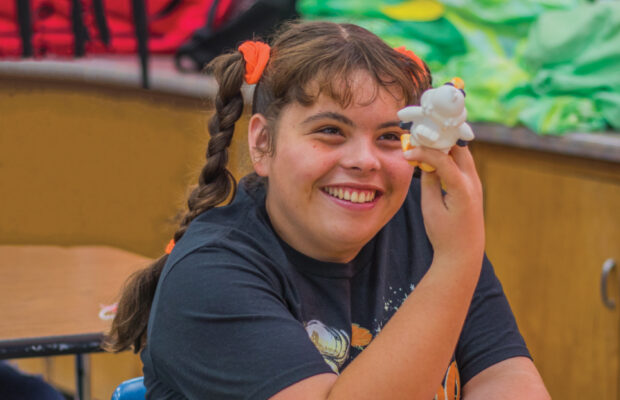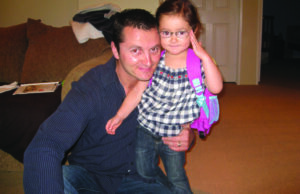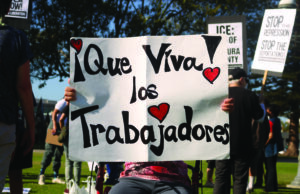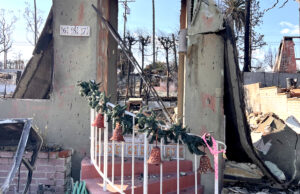Student resources benefit the community

Wellness Center
With the help of county funding, the brand new Wellness Center has opened on campus. It provides a safe space for students to go to relax and destress, with or without an appointment, giving support for students at varying levels.
Paige Pensivy, a mental health clinician at the Wellness Center, encourages students to utilize the resources available. “If you’re stressed during class or maybe just had a bad morning or if lunch is over stimulating you can walk into the Wellness Center,” Pensivy said. “Every teacher also has a Wellness Center pass that you can ask from a teacher for and you can walk and come in here and deregulate, get some help, talk to someone and then we send you back to class.”
The second tier revolves around individual and group series. “If you want individual or group therapy, we provide those services with parent consent and also give out resources on Thursdays with our wellness events. We put out a table either in the quad or right outside the room and we give out resources and materials for that month’s awareness,” Pensivy said.
The Wellness Center also provides many group events to learn new skills and strategies. “We offer monthly workshops… [In] October we have journaling workshops where you learn how to journal and habit track and make a schedule,” Pensivy said.
With the future of students in mind, Allison Seltz, the Assistant Principal of Student Support Services, helps students in need of mental health support. “A lot of times if a student will reach out, they’ll come in here, and we will chat about whatever’s going on, then I’ll refer kids to the counselors or I refer a lot of kids to the Wellness Center,” Seltz said.
So far, the Wellness Center has helped around 400 people. “As a district, our plan is that we continue to get funding for all high schools, and then we’d love to expand to middle school to make sure there’s a room at every middle school and then our future plans are to make the events bigger and have a mental health week,” Pensivy said.
Seltz stresses the importance that students seek help now, so that they will remain successful even when help is not as accessible. “I think mental health is a big struggle that students should have more resources to help them with, and that is exactly what we are trying to do right now, so that when students are adults, they will be able to take care of themselves and hopefully not struggle too much,” Seltz said.
College & Career Center
Having a stable mental state of mind is equally as important as preparing for your future. For many, the transition from high school to college can be overwhelming. Luckily, our campus has great resources at the College and Career Center (CCC) to help students easily learn about college.
Brittany Hong, the college and career guidance specialist, explained some of the benefits of the CCC. “[The CCC] help[s] you to prepare to know what you should be taking [in high school] to get to the college of your choice and also finding the right fit so you know what colleges you should apply to based off your interests and what you want to get out of college,” Hong said.
The CCC also has many events to help students find a career. “We host several colleges here as well as the military and careers,” Hong said. Representatives from different educational institutions come in to talk to students. “They come here to tell you about the opportunities that you’ll have after high school as well as any help for college applications, financial aid, finding a job, or getting your work permit,” Hong said. “Attend as many of the events that we host. The more that you become familiar with the verbiage that people are using after high school, the easier it’ll become for you to understand what you want to do and also make an appointment to come see us.”
Nick Guerin, the career education coordinator and teacher on special assignment (TOSA), helps manage grants for career technical education (CTE) programs. “I work directly with teachers and students and provide work based learning experiences [such as] internships, job shadows, field trips, [and] informational interviews,” Guerin said. “I also teach work experience [which is a] class where students can earn credit for attending class and having a part time job.”
In addition to career exploration, Guerin helps students who want to pursue education after high school. “I work a lot with our community college so Moorpark, Oxnard, and Ventura in relation to their career and education programs,” Guerin said. “My advice is to start exploring your strengths and interests now, so by the time you graduate you have 1 or 2 more viable options that you’re excited about pursuing that will lead to a successful and fulfilling life.”
Many students find the CCC to be very useful. Jesus Gonzalez, senior, stopped by to get information for college and found it to be very productive. “Mrs. Hong helped me a lot in [thinking about] community college and how you can transfer from community colleges to universities,” Gonzales said. “I would come back to the CCC because they are really helpful and give lots of information, and I highly recommend going.”
Newcomer Program
Newbury Park High School’s Newcomer Program was established at the beginning of this year. The program helps to provide students who have been in the country for 14 months or less with resources to help them get the most out of high school.
Norma Lopez Magaña, the social worker for the NPHS Newcomer Program, provides students with tools to succeed. “Let’s say, for example, there is a student who [is missing] some basic needs in the home,” Magaña said. “I can help the student connect with community resources, whether that be within the school district so we could have some school supplies here in school or in the community.”
Magaña bridges the gap for non-English speaking students who may struggle to connect with resources in their community. Dr. Ricardo Araiza, CVUSD’s Director for Multilingual Learners and Equity, recognizes some of the different ways students can benefit from the program. “We have several newcomers who are interested in joining soccer[…] so [Magaña] connected them with the soccer trials, [and provided] the flyer. And then protocols, you know, we have students who are interested, just so that they are able to access this program,” Araiza said. “Social workers in place to support them with that type of connection and conduct connection not just to the school, but everything around. Tutoring is another example.”
Magaña helps organize the English Learning (EL) tutoring center. “We just started our EL tutoring center for newcomer students. So this is for students that are in need of tutoring for different subject matters and for some students that are just wanting to practice their English,” Magaña said. One way the Newcomer Program is working to help native Spanish speakers at NPHS is with an English-learning center on Mondays and Thursdays in room E4. “If anyone is interested in being a tutor, definitely contact me,” Magaña said.
Newbury Park High School is the only school in CVUSD to have a Newcomer Program. “We decided just because there tends to be more [newcomer] students at Newbury Park, we’re wanting to focus on just one high school instead of all CVUSD Highschools at one time,” Araiza said.
Currently, there are 46 newcomers at Newbury Park High School, more than any other school in the district. Brian Mercer, CVUSD’s Director for High School and High School Education explained some of their plans for the future. “If the numbers increase and we have enough resources and enough funding to expand it to different sites then that could be a possibility, but right now, in the immediate future, the plan is to keep it at Newbury Park,” Mercer said.
Learning Essentials Academic Program
The Learning Essentials Academic Program, also called the LEAP program, is an all-in-one learning experience for students in special education classes at NPHS. In the LEAP program, students can be found learning how to count money, picking fruit from their garden and practicing social skills. Anne Alvarez is a teacher in the LEAP program. “[We] teach our kids to be functional for the community. We’re teaching them life skills,” Alvarez said.
Students in the LEAP program partake in a unique curriculum which teaches aspects of traditional school subjects integrated with skills that will allow them to live an independent life after high school. Lora Harney is another teacher within the program. “We connect learning to skills. So we integrate the curriculum with skills that would allow them to function better in an independent life,” Harney said.
Adapted Physical Education (APE) is one aspect of LEAP, led by coach Samantha Stewart. “My goal is to teach them skills at catching, throwing, all of those skills, but then being able to take what they’re learning and implement it into going to the gym with their family, or maybe joining the Special Olympics, or having the knowledge to be able to generalize it from the class to a sport, or maybe at home they play cornhole, that kind of stuff, [we’re] giving them that and then working on their health as well,” Stewart said.
Hands-on work experience is another important aspect of the program. “We’ll go out in the community and work at different places, like CVS is one of ours, in addition to The Alamo, Mary Health of the Sick, and Sanchos. And then within the classroom we fold bulletins for the church, for those kids that have a hard time in that environment,” Stewart said. “We’re also starting with a new program, where we go out to a horse ranch, and learn how to feed the horses, pick up the manure, brush them, clean them, and walk them. So we have a variety of things for the kids so they know what they want later in life.”
While it is not a traditional learning experience, the teachers help all the students in the LEAP program thrive. Students are treated with respect and are taught how to independently succeed in a real life world. “We have a variety of things for kids so they will know what they want later in life,” Stewart said.



